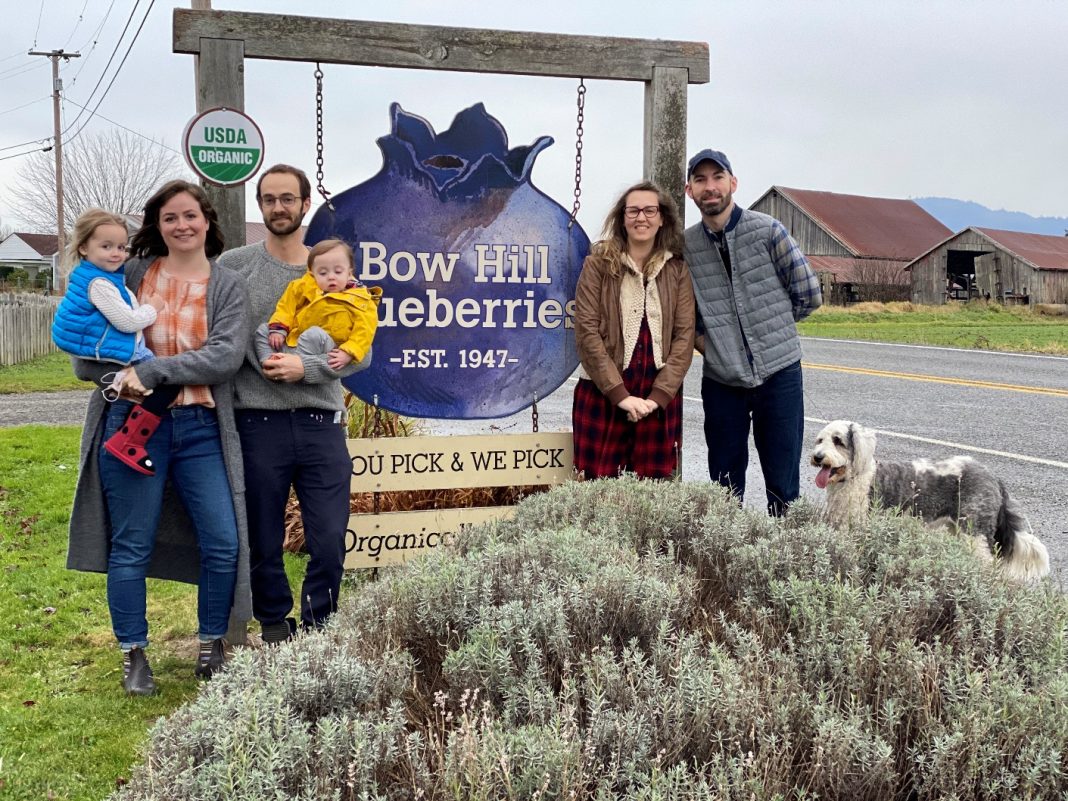The origin of Skagit Valley’s oldest family-run blueberry farm springs from a somewhat unlikely source: a traveling salesman. Today, Bow Hill Blueberries produces around 70,000 pounds of organic heirloom blueberries annually. But prior to 1947, the roughly 40-acre farm purchased by Severin and Ane Anderson in 1933 had transitioned through periods growing strawberries, the medicinal herb goldenseal, and raising mink for fur and oil.
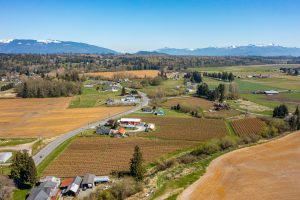
But that year, a New Jersey salesman came knocking with blueberry plants, forever altering the farm’s focus. The Anderson family continued operating the farm until 2008, when they sold it to the Soltes family. In November 2020, the now 7.5-acre berry farm came under the management of its current owners – the brother-and-sister duo of Audrey Matheson and Ezra Ranz.
With their respective spouses and a handful of year-round and seasonal employees, Matheson, 37, and Ranz, 33, concluded their first harvest of the farm during summer 2021, while also bringing back the farm’s popular u-pick season after a 2020 hiatus due to COVID-19.
“It’s always really fun to hear people’s memories of coming to the farm and working,” says Matheson, of the farm’s multi-generational presence in the Skagit Valley.
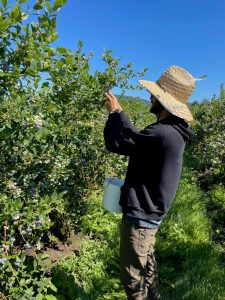
The siblings grew up in northeastern California’s Sierra Valley, on a five-acre property. Their parents, always environmentally-conscious, had a large garden, horses and chickens. “Growing up there, we got to learn a lot about plants and native species,” Matheson says. “I think that that sort of spurred both of our interests in the sustainable, agricultural field.”
After college, Matheson and her brother took a permaculture and organic gardening certificate course from the University of California, Santa Cruz, and kicked around the idea of eventually working together in that field.
Ranz and his wife moved to Bellingham in 2015, while Matheson and her husband moved to Seattle in 2017. When the pandemic struck in 2020, Matheson and her brother’s wife both lost their jobs. While investigating other employment, they found out Bow Hill Blueberries was for sale, and the two couples decided the time was right to collaborate.
Fresher than Fresh
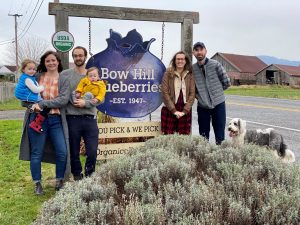
Bow Hill Blueberries has about five acres of certified organic heirloom blueberries, with another 2.5 acres of transitional organic berries recently purchased from a neighboring property. Matheson says that patch should be fully organic by 2023.
There are four varieties of heirloom (defined as a crop in commercial production for at least 50 years) berries grown at Bow Hill: Bluecrop, Jersey, Rubel and Stanley. Each type has slightly different tastes, sizes and other properties that make them ideal for specific purposes.
Their Jersey berries, for instance, have a sweetness that makes them perfect for the farm’s best-selling blueberry juice, which like its other array of blueberry products, are made on-site at the farm’s production facility.
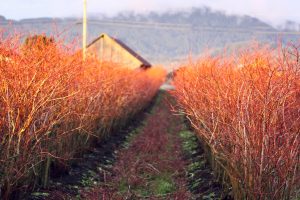
The blueberry season, like that of other locally-grown berries, is brief. Harvesting typically lasts from mid-July to early September, depending upon conditions. Each spring, before the berries bloom, the farm brings about 30 hives of bees on-site for pollination purposes, though Matheson says native bees that wander onto the farm can be even more efficient pollinators.
About 20% of Bow Hill’s haul is sold fresh to consumers, while the remaining 80% is either frozen or used in its production line. About 6 to 8 employees help run the farm, a number that balloons towards 25 during a harvest, when professional berry pickers are hired. Those who visit the farm or buy berries at their peak freshness, Matheson says, are often giddy about just how good they taste.
“We definitely have people who’ve come to the farm, had some of our fresh berries, and then they’re like, ‘You’ve ruined us! We can’t go back to buying blueberries from the store anymore,’” she says with a laugh.
Plenty of Options
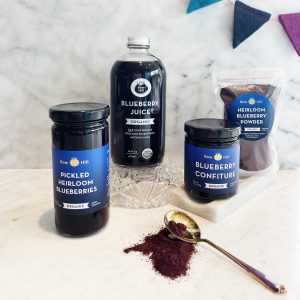
Photo courtesy: Bow Hill Blueberries
In addition to Bow Hill’s cold-pressed blueberry juice, the farm also produces pickled blueberries, which have won national Good Food Awards in three of the past five years. The pickled berries have both sweet and savory applications, including as a topping for salmon, salad, or even vanilla ice cream.
The farm also produces blueberry powder, a low-sugar fruit spread known as confiture, a marinade and salad dressing, and dried blueberries. Bow Hill has also collaborated with other local businesses, like Lopez Island Creamery and Handmade. La Conner, to create both ice cream and a sugar skin scrub using their fruit.
In addition to their farm and online store, Bow Hill’s blueberries and products are available at Haggen stores throughout Whatcom and Skagit counties, the Skagit Valley Food Co-op, as well as several PCC Community Markets in the Seattle area. They’re also available at several seasonal farmers markets in Everett and Edmonds, and year-round in Ballard.
Tours of Bow Hill Blueberries are also available, and can be booked on their website. Visiting, Matheson says, is a chance for people to become more educated about both certified organic farming methods and the fragile seasonality of the berries themselves.
After nearly 75 years and three different families, it’s clear that the blue-hued history of this Skagit Valley farm has many more chapters yet to be written.
































